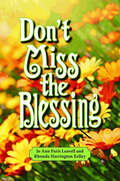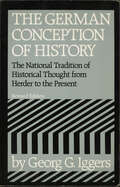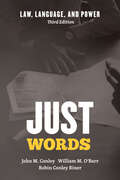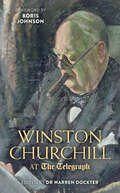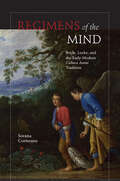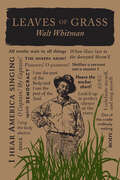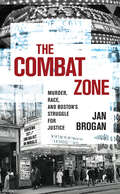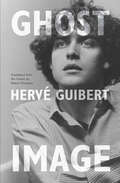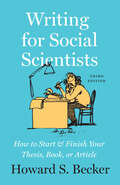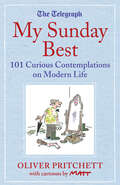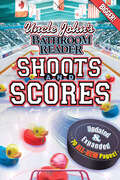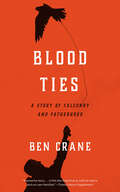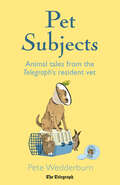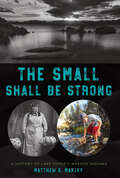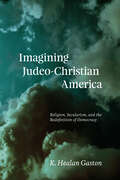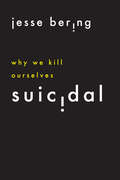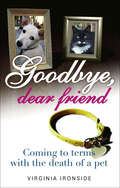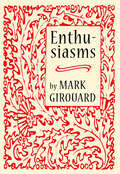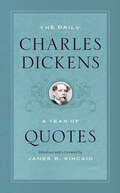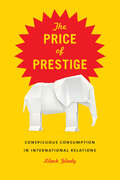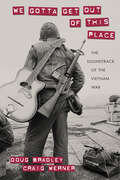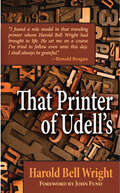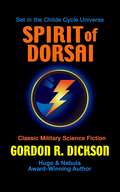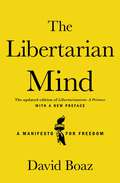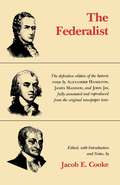- Table View
- List View
Don't Miss the Blessing
by Jo Ann LeavellRecalling the rich experiences from her marriage to Dr. Landrum P. Leavell II, past president emeritus of New Orleans Baptist Theological Seminary, Jo Ann Paris Leavell provides a guide for Christian women, particularly ministers&’ wives. She discusses such topics as family and finances, while emphasizing the importance of communication and daily worship. With optimism apparent on each page, Leavell encourages women to use their God-given gifts to shape a positive self-image and achieve their goals of spiritual growth.
The German Conception of History: The National Tradition of Historical Thought from Herder to the Present
by Georg G. IggersThe first comprehensive critical examination in any language of the German national tradition of historiography This is the first comprehensive critical examination in any language of the German national tradition of historiography. It analyzes the basic theoretical assumptions of the German historians of the nineteenth and twentieth centuries and relates these assumptions to political thought and action. The German national tradition of historiography had its beginnings in the reaction against the Enlightenment and the French Revolution of 1789. This historiography rejected the rationalistic theory of natural law as universally valid and held that all human values must be understood within the context of the historical flux. But it maintained at the same time the Lutheran doctrine that existing political institutions had a rational basis in the will of God, though only a few of these historians were unqualified conservatives. Most argued for liberal institutions within the authoritarian state, but considered that constitutional liberties had to be subordinated to foreign policy—a subordination that was to have tragic results. Mr. Iggers first defines Historismus or historicism and analyzes its origins. Then he traces the transformation of German historical thought from Herder's cosmopolitan culture-oriented nationalism to exclusive state-centered nationalism of the War of Liberation and of national unification. He considers the development of historicism in the writings of such thinkers as von Humboldt, Ranke, Dilthey, Max Weber, Troeltsch, and Meinecke; and he discusses the radicalization and ultimate disintegration of the historicist position, showing how its inadequacies contributed to the political débâcle of the Weimar Republic and the rise of National Socialism. No one who wants to fully understand the political development of national Germany can neglect this study.
Just Words: Law, Language, and Power (Chicago Series in Law and Society)
by Robin Conley Riner John M. Conley William M. O'BarrIs it “just words” when a lawyer cross-examines a rape victim in the hopes of getting her to admit an interest in her attacker? Is it “just words” when the Supreme Court hands down a decision or when business people draw up a contract? In tackling the question of how an abstract entity exerts concrete power, Just Words focuses on what has become the central issue in law and language research: what language reveals about the nature of legal power. John M. Conley, William M. O'Barr, and Robin Conley Riner show how the microdynamics of the legal process and the largest questions of justice can be fruitfully explored through the field of linguistics. Each chapter covers a language-based approach to a different area of the law, from the cross-examinations of victims and witnesses to the inequities of divorce mediation. Combining analysis of common legal events with a broad range of scholarship on language and law, Just Words seeks the reality of power in the everyday practice and application of the law. As the only study of its type, the book is the definitive treatment of the topic and will be welcomed by students and specialists alike. This third edition brings this essential text up to date with new chapters on nonverbal, or “multimodal,” communication in legal settings and law, language, and race.
Winston Churchill at the Telegraph
by Dr Warren Dockter And Boris JohnsonThis fascinating collection of reportage chronicles the Prime Minister’s life through the newspaper where he began his career.The Telegraph had a uniquely close connection with Winston Churchill at every stage of his life. Beginning with his early days as a war correspondent for the paper, the association continued as he himself became the news—reported on in its pages at every stage of his historic political career.Collected here, for the first time, is the best reportage on this complex man. Unencumbered by the legendary status he would later acquire, there is praise and blame in equal measure: finding space for both dramatic accounts of his wartime premiership and affectionate reports on the animals living at Chartwell, his country estate.The Telegraph was also a happy home for Churchill the journalist, and featured within are many pieces written in his unmistakable prose. Capturing the urgency of the time in which he lived, Churchill at the Telegraph is a celebration of an intimate relationship that lasted over sixty years and shows Winston Churchill in all his paradoxical glory.
Regimens of the Mind: Boyle, Locke, and the Early Modern Cultura Animi Tradition
by Sorana CorneanuIn Regimens of the Mind, Sorana Corneanu proposes a new approach to the epistemological and methodological doctrines of the leading experimental philosophers of seventeenth-century England, an approach that considers their often overlooked moral, psychological, and theological elements. Corneanu focuses on the views about the pursuit of knowledge in the writings of Robert Boyle and John Locke, as well as in those of several of their influences, including Francis Bacon and the early Royal Society virtuosi. She argues that their experimental programs of inquiry fulfill the role of regimens for curing, ordering, and educating the mind toward an ethical purpose, an idea she tracks back to the ancient tradition of cultura animi. Corneanu traces this idea through its early modern revival and illustrates how it organizes the experimental philosophers’ reflections on the discipline of judgment, the study of nature, and the study of Scripture. It is through this lens, the author suggests, that the core features of the early modern English experimental philosophy—including its defense of experience, its epistemic modesty, its communal nature, and its pursuit of “objectivity”—are best understood.
Leaves of Grass: The Poems Of Walt Whitman (Word Cloud Classics)
by Walt WhitmanA seminal event in American literature, this nineteenth-century collection of poetry and essays celebrates nature and humanity&’s place in it.Leaves of Grass is a timeless collection of poems and essays penned by influential nineteenth-century writer Walt Whitman. This profound compilation explores topics such as nature, mysticism, mortality, transcendentalism, and democracy. Inspired by personal experiences and observations, Whitman spent almost four decades piecing together the complete work, sharing societal ideals and epiphanies about life that still resonate with readers today.
The Combat Zone: Murder, Race, and Boston's Struggle for Justice
by Jan BroganThe story of a Harvard student&’s murder in 1970s Boston amid racial strife and rampant corruption, told with &“careful reporting and historical context&” (Providence Journal). Shortlisted for the 2021 Agatha Award for Best Non-Fiction and the 2022 Anthony Award for Best Critical or Nonfiction Work At the end of the 1976 football season, more than forty Harvard athletes went to Boston&’s Combat Zone to celebrate. In the city&’s adult entertainment district, drugs and prostitution ran rampant, violent crime was commonplace, and corrupt police turned the other way. At the end of the night, Italian American star athlete Andy Puopolo, raised in the city&’s North End, was murdered in a stabbing. Three African American men were accused of the crime. The murder made national news, and led to the eventual demise of the city&’s red-light district. Starting with this brutal murder, The Combat Zone tells the story of the Puopolo family&’s struggle with both a devastating loss and a criminal justice system that produced two trials with opposing verdicts, all within the context of a racially divided Boston. Brogan traces the contentious relationship between Boston&’s segregated neighborhoods during the busing crisis; shines a light on a court system that allowed lawyers to strike potential jurors based purely on their racial or ethnic identity; and lays bare the deep-seated corruption within the police department and throughout the Combat Zone. What emerges is a fascinating snapshot of the city at a transitional moment in its recent past. &“The grim history of racism in Boston, the crime and corruption of the Combat Zone, and the legal permutations of the case take up the bulk of the book. But its heart lies in a character who wasn&’t even in the Combat Zone that fateful night—the victim&’s brother, Danny Puopolo.&” —Providence Journal Includes photographs
Ghost Image
by Hervé GuibertGhost Image is made up of sixty-three short essays—meditations, memories, fantasies, and stories bordering on prose poems—and not a single image. Hervé Guibert’s brief, literary rumination on photography was written in response to Roland Barthes’s Camera Lucida, but its deeply personal contents go far beyond that canonical text. Some essays talk of Guibert’s parents and friends, some describe old family photographs and films, and spinning through them all are reflections on remembrance, narcissism, seduction, deception, death, and the phantom images that have been missed. Both a memoir and an exploration of the artistic process, Ghost Image not only reveals Guibert’s particular experience as a gay artist captivated by the transience and physicality of his media and his life, but also his thoughts on the more technical aspects of his vocation. In one essay, Guibert searches through a cardboard box of family portraits for clues—answers, or even questions—about the lives of his parents and more distant relatives. Rifling through vacation snapshots and the autographed images of long-forgotten film stars, Guibert muses, “I don’t even recognize the faces, except occasionally that of an aunt or great-aunt, or the thin, fair face of my mother as a young girl.” In other essays, he explains how he composes his photographs, and how—in writing—he seeks to escape and correct the inherent limits of his technique, to preserve those images lost to his technical failings as a photographer. With strains of Jean Genet and recurring themes that speak to the work of contemporary artists across a range of media, Guibert’s Ghost Image is a beautifully written, melancholic ode to existence and art forms both fleeting and powerful—a unique memoir at the nexus of family, memory, desire, and photography.
Writing for Social Scientists: How to Start & Finish Your Thesis, Book, or Article (Chicago Guides to Writing, Editing, and Publishing)
by Howard S. BeckerThe classic guide to avoiding pitfalls and achieving success in academic writing—in a fully updated edition with a new preface by the author.For decades, Writing for Social Scientists has been a lifeboat for academic writers of all fields, from beginning students to seasoned professionals. With reassuring candor, author and sociologist Howard S. Becker identifies some of the common problems all academic writers face, including from procrastination and stifling perfectionism to getting caught up in the trappings of “proper” academic writing, and struggling with the when and how of citations. He then offers concrete advice, based on his own experiences and those of his students and colleagues, for overcoming these obstacles and gaining confidence as a writer.This new edition has been updated throughout to reflect the contemporary landscape of academic writing, offering a new generation of scholars and students encouragement to write about society or any other scholarly topic clearly and persuasively. As academics are called upon to write more often, in more formats, Writing for Social Scientists continues be an important resource for any writer’s shelf.
My Sunday Best: 101 Curious Contemplations on Modern Life
by Oliver PritchettA witty compendium of musings on modern life from two of Britain’s best-loved father and son humorists.Ever unafraid to tackle the great matters of the day—and even more at home in the company of the apparently trivial—Oliver Pritchett might lament the lost art of how to end a tedious phone conversation, report on his investigations into the world’s “superfruits,” or answer such a pressing question as, How does one spot a Bank Holiday? Why do we clap at things that don’t need applause? or, What is the correct protocol should Prince William land a helicopter in one’s garden?Anthologized for the first time, and illustrated by his son Matt’s brilliantly witty cartoons, Oliver’s writings reflect upon just how quaint, odd and beautifully absurd life is.So we invite you to sit back and enjoy this whimsical and comical collection of curious contemplations, which quite simply, well, “Just occured to me . . .”
Uncle John's Bathroom Reader: Updated & Expanded Edition (Uncle John's Bathroom Reader)
by Bathroom Readers' InstituteUpdated & expanded—this entry in the bestselling bathroom reader series is full of hockey trivia on the sport&’s colorful history, legendary players, and more. The Bathroom Readers&’ Institute has added seventy all-new pages to this collection of tales and trivia about the Greatest Game on Ice. You&’ll find loads of new articles, plus updated facts throughout. So tighten your laces and grab your stick—it&’s Hockey Time! Read about . . . · Octopuses, rubber rats, and other animal ice-capades · What&’s up with those hockey haircuts? · The science behind the slap shot · Why are hockey goalies so weird? · And of course—how did Gretzky get so good? Get ready for some end-to-end action!
Blood Ties: A Story of Falconry and Fatherhood
by Ben CraneRaised in rural England before the rise of the internet, Ben Crane grew up in the company of wild things, with hawks and other birds of prey alive in his mind—and woods and fields—as symbols of a kind of self-possessed, solitary power. He spent time with them, knew them, and loved them. But as Crane grew into adulthood, situations that may seem to many of us natural, or even comforting, were challenging: he found it difficult to be around other people and to read social cues, sometimes retreating in fear or lashing out in misunderstanding. Eventually, he was diagnosed as being on the autism spectrum. When Crane became a father, these challenges became unbearable, and he fled to isolation. Hawks brought him back. In this artful and moving memoir, we follow Crane on his remarkable journey of flight and return. Traveling from the United Kingdom to Pakistan, we learn first about the history and practice of falconry, a beautiful and brutal partnership between humans and birds that has persisted for thousands of years. And as Crane’s personal story unfolds, we come to understand how he found solace and insight through his relationships with these animals. “I saw that my feelings toward nature, and birds of prey in particular, ran in parallel with my feelings for my son,” Crane writes. “I worked out that they were, in fact, two sides of the same coin—the deep love of one could, with gentle observation, inform and unlock the deep love for the other. . . . Perhaps this then is the central theme of my story.” Many of us rely upon animal companions to provide a sense of joy, compassion, and empathy. But as Blood Ties teaches us, our relationships with the creatures among us can also transform us, illuminating what it means both to be human and to be part of the greater wild—what it means to be alive.
Pet Subjects: Animal Tales from the Telegraph's Resident Vet
by Pete WedderburnPete the Vet has seen it all – whether Apollo the hamster, Nero the cat, Samson the rabbit or Ned the terrier, he has come across a whole host of cases that aren't in the textbook. With nearly twenty-five years at a veterinary clinic combined with ten years spent on the Telegraph answering reader's questions and a weekly spot on Irish breakfast TV he has dealt with sick pets from the big to the small. Whether that is a giant tortoise or a budgie, there is no case too extraordinary for Pete. Drawing on his experience from his own veterinary practice Pete has a wealth of stories – heart-warming as well as heartbreaking – that are told with a witty and engaging turn of phrase. Pet Subjects is a collection of case studies where the reader works beside Pete to try and cure his patients. Once solved, Pete helpfully provides further Q&As to cover a wider range of ailments related to the main story. A captivating and essential read for anyone who cares for a pet of their own.
The Small Shall Be Strong: A History of Lake Tahoe's Washoe Indians
by Matthew S. MakleyFor thousands of years the Washoe people have lived in the shadows of the Sierra Nevada Mountains. At the center of their lands sits beautiful Lake Tahoe, a name derived from the Washoe word Da ow a ga. Perhaps because the Washoe population has always been small or because it has been more peaceful than other tribal communities, its history has never been published. In The Small Shall Be Strong, Matthew S. Makley demonstrates that, in spite of this lack of scholarly attention, Washoe history is replete with broad significance. The Washoes, for example, gained culturally important lands through the 1887 Dawes Act. And during the 1990s, the tribe sought to ban climbing on one of its most sacred sites, Cave Rock, a singular instance of Native sacred concerns leading to restrictions.The Small Shall Be Strong illustrates a history and raises a broad question: How might greater scholarly attention to the numerous lesser-studied tribes in the United States compel a rethinking of larger historical narratives?
Imagining Judeo-Christian America: Religion, Secularism, and the Redefinition of Democracy
by K. Healan Gaston“Judeo-Christian” is a remarkably easy term to look right through. Judaism and Christianity obviously share tenets, texts, and beliefs that have strongly influenced American democracy. In this ambitious book, however, K. Healan Gaston challenges the myth of a monolithic Judeo-Christian America. She demonstrates that the idea is not only a recent and deliberate construct, but also a potentially dangerous one. From the time of its widespread adoption in the 1930s, the ostensible inclusiveness of Judeo-Christian terminology concealed efforts to promote particular conceptions of religion, secularism, and politics. Gaston also shows that this new language, originally rooted in arguments over the nature of democracy that intensified in the early Cold War years, later became a marker in the culture wars that continue today. She argues that the debate on what constituted Judeo-Christian—and American—identity has shaped the country’s religious and political culture much more extensively than previously recognized.
Suicidal: Why We Kill Ourselves
by Jesse BeringThis personal inquiry into the psychology of suicide brings “compassion, confessional honesty, and academic perception” to a woefully misunderstood subject (Kirkus Reviews).Despite his success as a psychologist and writer, Jesse Bering spent most of his thirties believing he would probably kill himself. At times, the impulse to take his own life felt all but inescapable. When his suicidal thoughts began to fade, he felt relieved—but also curious. He wondered where they came from and if they would return; whether other animals experienced the same impulse, or if it was a uniquely human evolutionary development. In Suicidal, Bering answers all these questions and more.Drawing on personal stories, scientific studies, and remarkable cross-species comparisons, Bering explores the science and psychology of suicide. Revealing its cognitive secrets and the subtle tricks our minds can play on us, Bering helps readers analyze their own doomsday thoughts while gaining broad insight into the subject. Authoritative, accessible, personal, and profound, Suicidal will change the way you think about this most vexing of human problems.
Goodbye, Dear Friend: Coming to Terms with the Death of a Pet
by Virginia IronsideLosing a pet causes real grief—this book provides real understanding, comfort, and support to help you heal.It’s not odd, crazy or maladjusted to cry and feel utterly lost when a pet dies. Often that pet has been a close friend, uncritical, loyal, and devoted—bringing us countless hours of peaceful companionship and joyful play. There is no need to keep grief hidden or wonder why we can’t immediately “replace” our dead pet. Feelings deserve understanding and respect—not dismissive comments like “it’s just a cat” or “why don’t you get another dog?” that, even if well-meaning, can cause enormous distress to those who are mourning a genuine loss.Goodbye, Dear Friend acknowledges both the extent and depth of grief of a pet. Based on an avalanche of letters about pet loss the author has received at her advice column, as well as the experiences of historical figures like Sigmund Freud and Sir Walter Scott, the book takes us through the process of grieving, delving into such topics as putting a pet to sleep; taking comfort in memorials; and whether there is a pet heaven. With a list of further resources included, Goodbye, Dear Friend is essential for every pet owner, young or old, and will bring great solace at a time when one can feel most alone.
Enthusiasms
by Mark Girouard“Charming” essays on literature and life by the British raconteur who “often finds poignancy or humor in the seemingly trivial” (Publishers Weekly).Does a neglected masterpiece by Jane Austen enshrine her first love affair? Who was Vita Sackville West’s real grandfather? What clues are there to the identity of “Walter,” doyen of Victorian pornographers? When and why did P.G. Wodehouse mutate from hack to genius? Was Oscar Wilde really down and out in Paris? Was Brideshead really Madresfield?These and other excursions into literary or social history have developed out of Mark Girouard’s spare time enthusiasms, as diversions from his main occupation as an architectural historian. In nine essays he calls attention to points that have not been noticed before, corrects fallacies that have gotten into general circulation, suggests, identifies, redates, refutes, or pours a little cold water on unjustified romanticisms. Three further essays sample another enthusiasm, his own family background, and introduce characters such as the dwarf who had to stand on a bench to address the South African Parliament, the colonial governor who fell in love with his niece, and the dowager duchess with whom he spent his childhood on the edge of the park at Chatsworth.“An architectural historian fascinated not merely by buildings but, still more, by the ways of life which they supported and by the people whom they served.” —The Telegraph
The Daily Charles Dickens: A Year of Quotes (A Year of Quotes)
by Charles DickensA charming memento of the Victorian era’s literary colossus, The Daily Charles Dickens is a literary almanac for the ages. Tenderly and irreverently anthologized by Dickens scholar James R. Kincaid, this collection mines the British author’s beloved novels and Christmas stories as well as his lesser-known sketches and letters for “an around-the-calendar set of jolts, soothings, blandishments, and soarings.” A bedside companion to dip into year round, this book introduces each month with a longer seasonal quote, while concise bits of wisdom and whimsy mark each day. Hopping gleefully from Esther Summerson’s abandonment by her mother in Bleak House to a meditation on the difficult posture of letter-writing in The Pickwick Papers, this anthology displays the wide range of Dickens’s stylistic virtuosity—his humor and his deep tragic sense, his ear for repetition, and his genius at all sorts of voices. Even the devotee will find between these pages a mix of old friends and strangers—from Oliver Twist and Ebenezer Scrooge to the likes of Lord Coodle, Sir Thomas Doodle, Mrs. Todgers, and Edwin Drood—as well as a delightful assortment of the some of the novelist’s most famous, peculiar, witty, and incisive passages, tailored to fit the season. To give one particularly apt example: David Copperfield blunders, in a letter of apology to Agnes Wickfield, “I began one note, in a six-syllable line, ‘Oh, do not remember’—but that associated itself with the fifth of November, and became an absurdity.” Never Pecksniffian or Gradgrindish, this daily dose of Dickens crystallizes the novelist’s agile humor and his reformist zeal alike. This is a book to accompany you through the best of times and the worst of times.
The Price of Prestige: Conspicuous Consumption in International Relations
by Lilach GiladyIf wars are costly and risky to both sides, why do they occur? Why engage in an arms race when it’s clear that increasing one’s own defense expenditures will only trigger a similar reaction by the other side, leaving both countries just as insecure—and considerably poorer? Just as people buy expensive things precisely because they are more expensive, because they offer the possibility of improved social status or prestige, so too do countries, argues Lilach Gilady. In The Price of Prestige, Gilady shows how many seemingly wasteful government expenditures that appear to contradict the laws of demand actually follow the pattern for what are known as Veblen goods, or positional goods for which demand increases alongside price, even when cheaper substitutes are readily available. From flashy space programs to costly weapons systems a country does not need and cannot maintain to foreign aid programs that offer little benefit to recipients, these conspicuous and strategically timed expenditures are intended to instill awe in the observer through their wasteful might. And underestimating the important social role of excess has serious policy implications. Increasing the cost of war, for example, may not always be an effective tool for preventing it, Gilady argues, nor does decreasing the cost of weapons and other technologies of war necessarily increase the potential for conflict, as shown by the case of a cheap fighter plane whose price tag drove consumers away. In today’s changing world, where there are high levels of uncertainty about the distribution of power, Gilady also offers a valuable way to predict which countries are most likely to be concerned about their position and therefore adopt costly, excessive policies.
We Gotta Get Out of This Place: The Soundtrack of the Vietnam War (Culture and Politics in the Cold War and Beyond)
by Craig Werner Doug Bradley&“The diversity of voices and songs reminds us that the home front and the battlefront are always connected and that music and war are deeply intertwined.&” —Heather Marie Stur, author of 21 Days to Baghdad For a Kentucky rifleman who spent his tour trudging through Vietnam&’s Central Highlands, it was Nancy Sinatra&’s &“These Boots Are Made for Walkin&’.&” For a black marine distraught over the assassination of Martin Luther King Jr., it was Aretha Franklin&’s &“Chain of Fools.&” And for countless other Vietnam vets, it was &“I Feel Like I&’m Fixin&’ to Die&” or the song that gives this book its title. In We Gotta Get Out of This Place, Doug Bradley and Craig Werner place popular music at the heart of the American experience in Vietnam. They explore how and why U.S. troops turned to music as a way of connecting to each other and the World back home and of coping with the complexities of the war they had been sent to fight. They also demonstrate that music was important for every group of Vietnam veterans—black and white, Latino and Native American, men and women, officers and &“grunts&”—whose personal reflections drive the book&’s narrative. Many of the voices are those of ordinary soldiers, airmen, seamen, and marines. But there are also &“solo&” pieces by veterans whose writings have shaped our understanding of the war—Karl Marlantes, Alfredo Vea, Yusef Komunyakaa, Bill Ehrhart, Arthur Flowers—as well as songwriters and performers whose music influenced soldiers&’ lives, including Eric Burdon, James Brown, Bruce Springsteen, Country Joe McDonald, and John Fogerty. Together their testimony taps into memories—individual and cultural—that capture a central if often overlooked component of the American war in Vietnam.
That Printer of Udell's: A Story Of The Middle West
by Harold Bell WrightThe novel that inspired a young Ronald Reagan—and left him with &“an abiding belief in the triumph of good over evil.&” &“I found a role model in that traveling printer whom Harold Bell Wright had brought to life. He set me on a course I&’ve tried to follow even unto this day. I shall always be grateful.&” —Ronald Reagan, in a letter to Harold B. Wright&’s daughter-in-law in 1984 After reading this book at age eleven, Ronald Reagan experienced its lasting impact on his life, and it shaped his own moral sense. He identified with the central character, Dick Falkner, whose childhood was one of poverty and abuse from an alcoholic father. Recognizing his life for what it was, he ran away from his home, but he could not run away from all of his problems. Sixteen years later, he found himself hungry of body and empty of spirit in a small Midwestern town. Eventually, he is taken in by George Udell, a local printer and a kind-hearted man. George Udell gives the young man a job, and something more important: spiritual support. Through hard work and Christian morals, the man who becomes known as &“that printer of Udell&’s&” rises above his past to a new life with God, doing what he can to change the lives of the townspeople. &“[A] thoroughly good novel.&” —The Boston Globe &“This is a book that will appeal to both men and women. It should have a place in church libraries.&” —Church and Synagogue Library Association &“Many of Reagan&’s accomplishments, as well as his outlook on life, can be traced back to that dog-eared copy of That Printer of Udell&’s.&” —John Fund, The Wall Street Journal columnist, from his foreword
Spirit of Dorsai (Childe Cycle #5)
by Gordon R. DicksonThe Dorsai are the finest soldiers ever trained to fight and win against all odds. The Spirit of Dorsai is an illumination of the heart and soul of the planet Dorsai and its people, showing with epic clarity and unforgettable vision how why the Dorsai fight and live. It tells of the beginning when the first Dorsai was former by mercenaries willing to fight other's battles to buy freedom for their own homes. It tells how even children and old men fought for the dream of Dorsai. From the mouth of Amanda Morgan, direct descendant of two illustrious women who bore her name, the full story is told in all its splendour.
The Libertarian Mind: A Manifesto for Freedom
by David BoazAn updated edition of David Boaz&’s timeless primer on libertarianism, with a new preface by the author. Libertarianism—the philosophy of personal and economic freedom—has deep roots in Western civilization and in American history, with increasing appeal to those dissatisfied with the status quo. The growth of executive power, chronic deficits, counterproductive foreign military interventions, protectionist trade measures, a costly drug war, and many other threats to civil liberties have pushed millions of Americans in a libertarian direction. The Libertarian Mind is a comprehensive guide to the history and philosophy of this movement. This updated edition delves into the principles of libertarianism, exploring its roots and its development over time. It offers a rich collection of ideas that present a compelling case for individual liberty and mutual cooperation. Challenging the notion of top-down governmental control, the book advocates instead for a society built on freedom and individual rights. But The Libertarian Mind is more than just a book; it&’s a manifesto for freedom. It&’s a call to action for those who believe in the sovereignty and fundamental dignity of the individual and the importance of political freedom.
The Federalist
by Jacob E. CookeThis edition from a noted historian &“is the first definitive, variorum edition of the text of this much reprinted classic&” (The William and Mary Quarterly). The definitive edition of the historic essays by Alexander Hamilton, James Madison, and John Jay, fully annotated and reproduced from the original text. Also included are a new introduction by historian Jacob C. Cooke, along with notes, a glossary, as well as the complete Articles of Confederation, Declaration of Independence, and U.S. constitution. &“A high-quality, scholarly edition.&” –Library Journal &“Everyone who is interested in either the principles or the practice of government―in the age of the Fathers or in our own era of perplexity―should read it.&” ―Dumas Malone, History Book Club Review
